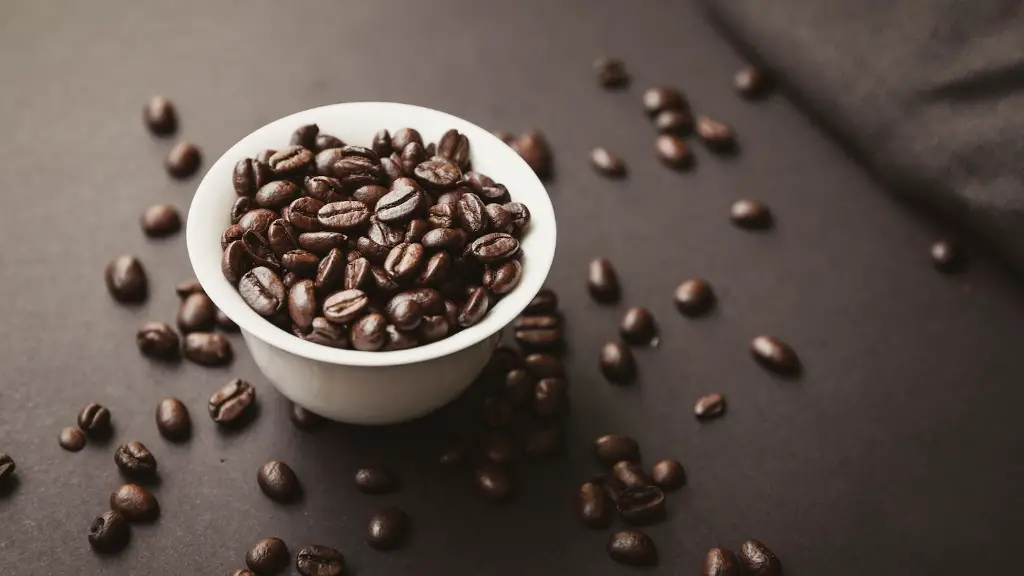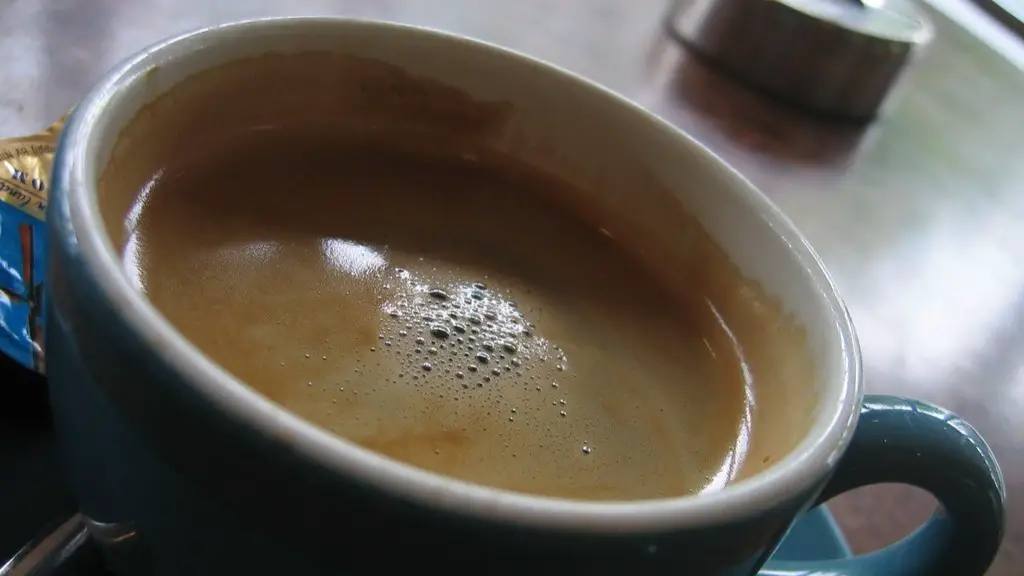Do energy drinks contain more caffeine than coffee? This is a question that has been asked for years, as many people are uncertain about which beverage will provide them with the most energy. It is true that some energy drinks can contain more caffeine than coffee, but there are always variables to consider.
Caffeine is a stimulant which can provide an energy boost. It can be found in many different foods and drinks, primarily coffee and tea, but also in energy drinks.
Caffeine is measured in milligrams (mg). The amount of caffeine in coffee can often drastically vary in different varieties. For example, a standard 8-ounce cup of coffee contains on average 95 mg of caffeine, while espresso has approximately 64 mg per serving. On the other hand, energy drinks can contain as much as 300 mg of caffeine for an 8.4-ounce can, depending on the brand.
According to an article written by Jennifer Loggins, a registered dietitian with the Be Well Nutrition Group, the effects of caffeine heavily depend on individual biology. For some people, coffee may provide a larger energy boost than energy drinks, as every human reacts differently to caffeine. This is why it is important to understand how much caffeine a person can consume in a day. For most adults, up to 400mg of caffeine is considered safe and healthy, although it is possible to consume larger amounts.
Lisa R. Young, registered dietician and nutrition expert, explains that caffeine is not the only variable in energy drinks. They can contain various other energy-boosting ingredients such as herbal extracts, vitamins, or amino acids, as well as added sugars. This can effect their energy-boosting properties or even lead to an upset stomach if consumed in large amounts. Coffee and tea also contain other beneficial components such as antioxidants, which can help reduce the risk of certain diseases.
All in all, it is clear that energy drinks can either have more or less caffeine than coffee. The best way to determine whether or not an energy drink has more caffeine than coffee is to look at the nutrition label. This will give a more accurate representation of the amount of caffeine in a particular drink, as it will include all other active ingredients.
Energy Drinks Effects
Most energy drinks are designed to provide a temporary energy boost and heightened concentration. This is not only due to the caffeine, but also other active ingredients such as taurine, guarana, and B vitamins. Most of these ingredients are safe and can provide important energy-boosting compounds.
According to the American Academy of Family Physicians, energy drinks can cause side effects such as hypertension, dizziness and dehydration. This is especially true if the drinks are consumed over long periods of time. Moreover, frequent consumption of energy drinks can also lead to an increase in anxiety and irritability.
However, moderate consumption of energy drinks can be beneficial if used correctly. For example, some people may find it helpful to consume energy drinks during periods of extreme fatigue or when studying for long exams. It is important to note, however, that frequent consumption of energy drinks can lead to serious health problems and even addiction.
In conclusion, it is important to understand the risks associated with energy drinks when deciding on the best one to consume. While most energy drinks may have higher amounts of caffeine than coffee, it is important to look at all the ingredients in the drink and make sure it is consumed in moderation.
Caffeine Alternatives
Caffeine is not the only way to gain energy. There are many alternatives that can help humans boost their energy levels without the risk of additives or side effects. One example is to engage in more physical activity. Exercise releases adrenaline and endorphins, which can increase energy levels and raise alertness. This can also improve overall health and wellbeing.
It is also important to get plenty of sleep. The body needs 7 to 9 hours of sleep each night in order to recharge and be alert. If a person does not get enough sleep, the body will become drained and fatigued. Another alternative is to drink plenty of water throughout the day. Staying hydrated can help boost energy levels and reduce fatigue.
Finally, some herbal supplements can be helpful. Some contain naturally occurring stimulants such as caffeine, while others are designed to regulate electrolytes and improve nutrition.
Overall, there are many alternatives to energy drinks and coffee that can help people improve their energy levels. It is important to understand the risks associated with energy drinks, and to look for healthier alternatives that are better for the body.
Energy Drinks for Athletes
In recent years, energy drinks have become more popular with athletes. This is due to the fact that they can provide a burst of energy that helps enhance physical performance. Most energy drinks are designed to quickly raise levels of alertness and help improve focus during long workouts.
That said, it is important to note that excessive consumption of energy drinks can lead to dehydration or an upset stomach. This can be especially dangerous during a physical activity. In addition, many energy drinks contain high amounts of sugar and artificial sweeteners, which can lead to health issues such as diabetes or weight gain.
For this reason, many athletes now opt to drink coffee instead of energy drinks. Coffee contains less sugar and calories, while still providing a boost in energy. In addition, coffee also contains antioxidants, which can help reduce inflammation from physical activity.
Consumption of coffee is not the only way for athletes to gain energy. Fruits, nuts and other whole foods can also provide a natural boost of energy that can be beneficial for athletes. Overall, it is important to understand the risks and benefits of both energy drinks and coffee, and to make an informed decision when it comes to boosting energy levels.
Energy Drinks and Diabetes
Most energy drinks contain high amounts of sugar and artificial sweeteners, which can increase the risk of diabetes. The American Diabetes Association recommends that people limit their consumption of energy drinks and instead choose drinks lower in added sugars such as water or unsweetened tea. The organization also recommends limiting other high-sugar beverages such as soda, fruit drinks and sports drinks.
Regular consumption of energy drinks can also lead to weight gain, as the body is unable to process added sugars efficiently. This can lead to insulin resistance, which increases the risk of type 2 diabetes. In addition, some energy drinks contain high amounts of caffeine, which can cause further health issues.
Furthermore, regular consumption of energy drinks can lead to addiction, as the body becomes “dependent” on the sugar and caffeine. This can lead to psychological and physical issues, such as increased anxiety and heart problems.
In conclusion, it is important to note the risks associated with energy drinks when it comes to diabetes. The best way to prevent health issues is to limit consumption of energy drinks and to focus on eating a balanced diet and exercising regularly.
Drink Alternatives for Kids
Children and teenagers should not consume energy drinks. The American Academy of Pediatrics recommends that children under the age of 18 should not consume energy drinks due to the risks associated with caffeine. Parents should instead offer children healthy alternatives such as water or unsweetened juice.
Fruit smoothies are an excellent choice for children, as they are full of vitamin C and other important vitamins and minerals. For an extra energy boost, some smoothies also contain ingredients such as oatmeal, avocados and nuts. These can help provide sustained energy without the risk of caffeine or added sugars.
In addition, some children may benefit from the consumption of tea. Green tea contains a small amount of caffeine, which can provide an energy boost without the risks of consuming too much caffeine. Green tea is also full of antioxidants and can help boost the immune system. For an added benefit, some varieties of green tea also contain herbs such as ginger, which can help reduce inflammation.
Overall, it is important for parents to understand the risks of energy drinks and to provide their children with healthier alternatives. Juice, tea, and smoothies are all excellent choices for children, as they are full of vitamins and minerals, while still providing an energy boost.





